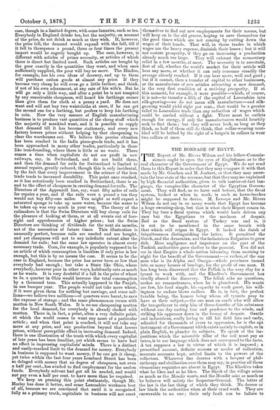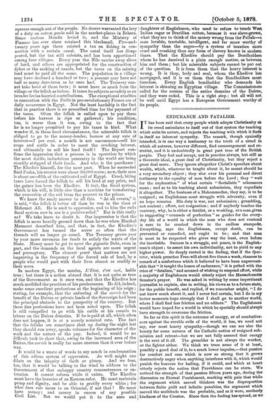THE BONDAGE OF EGYPT. T HE Report of Mr. Rivers Wilson
and his fellow-Commis- sioners ought to open the eyes of Englishmen as to the real character of the Government of Egypt. We do not send them to this Report in order that they may compare it with that made by Mr. Goschen and M. Joubert, or that they may ascer- tain the true state of the revenue, but that they may see explained by high financial authorities, given to talk matter-of-fact lan- guage, the vampire-like character of the Egyptian Govern- ment. They will find, as we have said before, that the fiscal system, looked at when in work, is such as horse-leeches might be supposed to devise. M. Lesseps and Mr. Rivers Wilson do not say in so many words that Egypt has become a huge sweating-shop, but that is what their Report comes to. They lay bare a fiscal system which would have driven any race but the Egyptians to the madness of despair. Bad as the fiscal system of Turkey was and is, it is not to be mentioned in the same breath with that which still reigns in Egypt. It lacked the finish of iniquitousness distinguishing the latter. It permitted the Greek, and the Armenian, and the industrious Bulgarian to grow rich. Mere negligence and impotence on the part of the Turkish authorities gave shelter to the peasant. You did not see in that Empire a whole nation labouring from morning to night for the benefit of the Government—or rather, of the one man who is its Alpha and Omega—whole provinces turned into so many houses of bondage, for the profit of one man. It has long been discovered that the Fellah is the very clay for a tyrant to work with, and the Khedive's Government has cruelly abused the discovery. The fellah asks no questions, makes no remonstrances, when he is plundered. His wants are few, his food simple, his capacity to work great, his will- ingness to endure blows endless. He is, in fact, the perfect taxable being, the human being whom all tyrants pray to have as their subject,—the one man on earth who will allow the tax-gatherer to strip him of three-fourths of his substance without one day casting fear and prudence to the winds, and striking his oppressor down in the frenzy of despair. Gentle and industrious, really loving to till his field late and early, schooled for thousands of years to oppression, he is the apt instrument of a Government which exists mainly to exploit, or in plain English, to plunder its subjects. To speak of the im- positions which the miserable tiller of the soil must pay as taxes, is to use language which does not correspond to the facts. A tax supposes a law in virtue of which it is imposed ; a prescribed amount, definite seasons or modes of collection, accurate accounts kept, settled limits to the powers of the collectors. Whatever fine decrees with a lacquer of phil- anthropy and civilisation over them may say, in practice all these elementary requisites are absent in Egypt. The Khedive takes what he likes and as he likes. The Sheik of the village seizes as much as the Moudir wants, and the Moudir asks as much as he believes will satisfy the Inspector-General. The letter of the law is the last thing of which they think. No decree or law binds the authorities when at their cruel work. They are answerable to no one ; their only fault can be failure to squeeze enough out of the people. No decree warranted the levy of a duty on cotton goods sold in the market-places in Behera. Some zealous Afoudir levied it, and the Ministry of Finance has ever since retained this blackmail. Five-and- twenty years ago there existed a tax on fishing in con- nection with a certain canal. The canal itself has disap- peared, but the tax still subsists, and has been apportioned among four villages. Every year the Nile carries away slices of land, and others are appropriated for the construction of dykes or the making of canals, but the taxes on the missing land must be paid all the same. The population in a village may have declined a hundred or two ; a peasant may have not half as many date-trees as he once had. The Treasury can- not take heed of these facts ; it must have as much from the village or the fellah as before. It taxes its subjects as rudely as an invader levies hurried contributions. The exceptional cruelties in connection with the Taille in pre-revolutionary France are of daily occurrence in Egypt. Not the least hardship is the fact that in practice there is no prescribed time for the payment of the taxes. Often the fellah is called upon to pay them before his harvest is ripe or gathered ; his condition, too; is worse than it was, owing to the fact that he is no longer permitted to pay his taxes in kind. What wonder if, in these hard circumstances, the miserable fellah is obliged to go to the money-lender, borrow at any rate of interest-7 per cent. a month is not uncommon—sell his crops and cattle in order to meet the crushing interest, and ultimately to sell his land itself ? The Report con- firms the impression that a process is in operation by which the most docile, industrious peasantry in the world are being steadily stripped of their lands. And who is the purchaser ? The Khedive himself, for the most part. When he succeeded Said Pasha, his estates were about 30,000 acres ; now, their area is about one-fifth of the cultivated soil of Egypt. Cruel, biting taxes have forced the fellah to sell his land at any price, and the gainer has been the Khedive. It fact, the fiscal system, which is his will, is little else than a machine for transferring the ownership of the soil from the peasant to the prince.
We know the ready answer to all this. " At all events," it is said, " the fellah is better off than he was in the time of Mehemet Ali. He is used to oppression, and to him the rude fiscal system now in use is a positive relief." But is this really so ? We take leave to doubt it. Our impression is that the fellah is more heavily ground down than he was when Marshal Marmont described him, and that, in fact, the Khedive's Government has turned the screw so often that the threads will no longer go round. The Treasury grows year by year more ravenous for funds to satisfy the wants of the State. Money must be got to meet the gigantic Debt, even in part, and the demands on the local agents are more urgent and peremptory. The clearest proof that matters are not improving is the frequency of the forced sale of land, by a people who would part with their lives almost as readily as their acres.
In modern Egypt, the maxim, L'Etat, c'est moi, holds true ; but there is a notion abroad that it is not quite so true of the Government as it once was, and that the Khedive has much modified the practices of his predecessors. He did, indeed, make some excellent professions at the beginning of his reign ; stating, for example, that the enforcing of the corre'e for the benefit of the Dairas or private lands of the Sovereign had been the principal obstacle to the prosperity of the country. But these fine professions have not been acted upon. The fellah is still compelled to go with his cattle or his camels to labour on the Dairas domains. If he is paid at all, which often does not happen, it is at a merely nominal rate. The fact that the fellahs are sometimes shut up during the night lest they should run away, speaks volumes for the character of the work and the nature of the pay. Indeed, it would be no difficult task to show that, owing to the increased area of the Dairas, the cor ve'e is really far more onerous than it ever before was.
It would be a waste of words to say much in condemnation of this odious system of oppression. As well might one dilate on the iniquity of theft or piracy. And we fear, too, that it would be talking to the wind to address to the Government of that unhappy country remonstrances or en- treaties. It cannot reform while it exists. The Khedive must have the luxuries of an Eastern ruler. He must maintain pomp and dignity, and be able to gratify every whim ; for what does rule mean to an Oriental, if not that ? He must have money ; and money in excess of any possible Civil List. But we would put it to the sons and daughters of Englishmen,-who used: to- refilse to tench Wet Indian sugar or Brazilian dotton, benatuis it was slave-grOWn, what they'are to think of the money Wrung-from the`Fellalr-aa man lovable, tractable, intelligent, and far. More' worthy- df sympathy than the negro—by a system of taxation Mott cruel and crushing than any form of slavery known in modern times. That the Khedive should pay the Bondholders whom he has deceived is a plain, enough matter, as between him and them ; but his miserable subjects cannot be put out of the question. It is from them that the heavy interest is wrung. It is they, body and soul, whom the Khedive- has mortgaged, and it is on them that the Bondholders must foreclose. Every English bondholder who demands his interest is skinning an Egyptian Village. The Cotmitissioners called for the cession of the entire doniains of the Dairat, and they were ceded. This is a' right step ; but will net be well until Egypt has a European Government worthy' df its people.



































 Previous page
Previous page